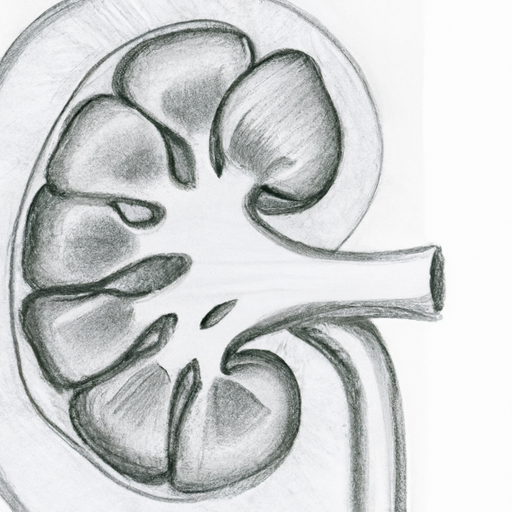Glomerulonephritis is a complex and potentially debilitating condition that affects the kidneys. It is characterized by inflammation of the glomeruli, the tiny filters in the kidneys responsible for removing waste and excess fluid from the blood. This inflammation can lead to a range of symptoms and complications, making early diagnosis and treatment essential. In this article, we will delve into the causes, symptoms, and diagnosis of glomerulonephritis, as well as explore the various treatment options available. Additionally, we will discuss the lifestyle changes and supportive care measures that can help individuals living with glomerulonephritis manage their condition effectively. So, whether you have recently been diagnosed or are seeking to expand your knowledge on this condition, this comprehensive guide will provide you with valuable insights and practical advice.
1. Understanding Glomerulonephritis: Causes, Symptoms, and Diagnosis
Glomerulonephritis is a kidney condition characterized by inflammation of the glomeruli, which are tiny structures in the kidneys responsible for filtering waste products and excess fluid from the blood. This inflammatory response can impair the kidneys’ ability to function properly, leading to various symptoms and complications.
The causes of glomerulonephritis can vary, and it can develop as a result of different factors. In some cases, it may be caused by an infection, such as strep throat or a viral infection. Other potential causes include autoimmune disorders, such as lupus or vasculitis, or certain medications and toxins. Sometimes, the exact cause of glomerulonephritis may remain unknown.
Symptoms of glomerulonephritis can vary depending on the severity of the condition. Common signs may include blood in the urine (hematuria), foamy urine due to excess protein (proteinuria), swelling in the legs, ankles, or around the eyes (edema), high blood pressure, and decreased urine output. Additionally, individuals with glomerulonephritis may experience fatigue, nausea, and shortness of breath as the condition progresses.
Diagnosing glomerulonephritis typically involves a combination of medical history evaluation, physical examinations, and laboratory tests. Initially, a healthcare professional may inquire about the patient’s symptoms, medical history, and perform a physical examination to assess any signs of kidney dysfunction. Subsequently, urine tests are conducted to detect the presence of blood and protein, which are indicative of glomerular damage. Blood tests may be performed to evaluate kidney function and identify potential underlying causes. Additionally, imaging tests, such as ultrasound or CT scans, may be recommended to assess the kidneys’ structure and rule out other possible conditions.
It is crucial to diagnose glomerulonephritis promptly to initiate appropriate treatment. The treatment plan may vary depending on the underlying cause and severity of the condition. In some cases, glomerulonephritis may resolve on its own without specific treatment, especially if it is
2. Treatment Options for Glomerulonephritis: A Comprehensive Guide
Treatment Options for Glomerulonephritis: A Comprehensive Guide
Glomerulonephritis is a complex kidney disorder that requires prompt and appropriate treatment to manage its symptoms and prevent further kidney damage. The treatment approach for glomerulonephritis primarily depends on the cause, severity of the condition, and individual patient factors. Here, we will discuss the various treatment options available for glomerulonephritis, aiming to provide a comprehensive guide for patients and healthcare professionals alike.
1. Medications:
Medications play a crucial role in managing glomerulonephritis. The choice of medication depends on the underlying cause and symptoms. Some commonly used medications include:
– Corticosteroids: These anti-inflammatory drugs help reduce inflammation in the kidneys and suppress the immune system’s response.
– Immunosuppressants: Medications such as cyclophosphamide, mycophenolate mofetil, and azathioprine are often prescribed to suppress the immune system and prevent further kidney damage.
– Angiotensin-converting enzyme (ACE) inhibitors and angiotensin receptor blockers (ARBs): These drugs help control blood pressure and reduce proteinuria, a common symptom of glomerulonephritis.
2. Antibiotics:
If the glomerulonephritis is caused by an infection, antibiotics may be prescribed to treat the underlying infection and prevent its spread to the kidneys. It is important to identify the specific pathogen causing the infection to guide the choice of antibiotics.
3. Diuretics:
Diuretics are commonly prescribed to manage fluid retention and edema associated with glomerulonephritis. These medications help increase urine production, reducing swelling and relieving symptoms.
4. Diet and Lifestyle Modifications:
In addition to medications, making certain lifestyle modifications and dietary changes can significantly improve the management of glomerulonephritis. Reducing salt intake, limiting protein consumption, and maintaining a healthy weight are often recommended. Patients are also advised to quit smoking and limit alcohol consumption, as
3. Living with Glomerulonephritis: Lifestyle Changes and Supportive Care
Living with Glomerulonephritis: Lifestyle Changes and Supportive Care
After being diagnosed with glomerulonephritis, it is crucial for individuals to make certain lifestyle changes to manage the condition effectively and prevent further complications. These changes, alongside medical treatment, can significantly improve the quality of life for those living with glomerulonephritis.
One of the most important aspects of managing glomerulonephritis is adopting a healthy lifestyle. This includes following a well-balanced diet that is low in salt, saturated fats, and cholesterol. It is essential to limit the intake of processed foods, fast food, and canned goods, as they are often high in sodium. Instead, individuals should focus on consuming fresh fruits, vegetables, lean proteins, whole grains, and low-fat dairy products. A registered dietitian can provide personalized dietary recommendations and help develop a meal plan that suits individual needs.
Additionally, maintaining a healthy weight is crucial for individuals with glomerulonephritis. Excess weight can put additional strain on the kidneys and worsen the condition. Engaging in regular physical activity, as advised by a healthcare professional, can help manage weight, reduce blood pressure, and improve overall cardiovascular health. However, it is essential to consult a healthcare provider before starting any exercise regimen, as certain activities may need to be modified or avoided depending on the individual’s specific condition.
In terms of supportive care, managing stress levels is vital for individuals with glomerulonephritis. Stress can have a negative impact on overall health and may exacerbate symptoms. Engaging in stress-reducing activities such as meditation, deep breathing exercises, yoga, or pursuing hobbies can help alleviate stress and promote emotional well-being.
It is also crucial for individuals with glomerulonephritis to closely monitor their blood pressure and blood sugar levels. High blood pressure can further damage the kidneys, while uncontrolled blood sugar levels can affect kidney function. Regular check-ups with healthcare providers, adherence to prescribed medications, and lifestyle modifications can help keep these levels within a

